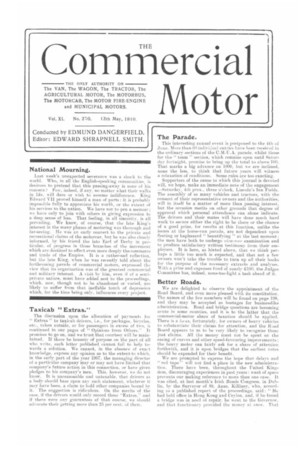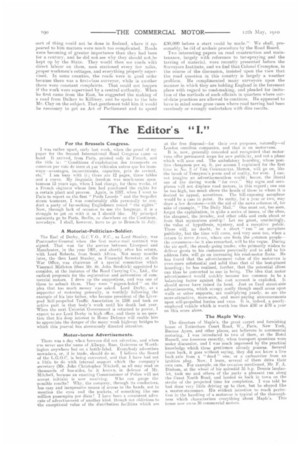National Mourning.
Page 1

Page 2

If you've noticed an error in this article please click here to report it so we can fix it.
Last week's unexpected severance was a shock to the world. Who, in all the English-speaking communities. is desirous to pretend that this passing-away is none of his concern? Few, indeed, if any, no matter what their walks in life, will dare or wish to assume indifference. King Edward VII proved himself a man of parts : it is probably impossible fully to appreciate his worth, or the extent of his services to the nation. We have not to pen a memoir ; we have only to join with others in giving expression to a deep sense of loss. That feeling, in all sincerity. is all pervading. We know, of course, that the late King's interest in the many phases of motoring was thorough and far-seeing. He was an early convert to the private and recreational claims of the motorcar, hut he was also closely informed, by his friend the late Earl of Derby in particular, of progress in those branches of the movement which are destined to affect even more deeply the commerce and trade of the Empire. It is a rather-sad reflection, but the late King, when he was recently told about the forthcoming parade of commercial motors, expressed the view that its organization was of the greatest commercial and military interest. A visit by him, even if of a semiprivate nature, must have added zest to the proceedings, which, now, though not to be abandoned or varied, are likely to suffer from that ineffable tone!' of depression which, for the time being only, influences every project.
Taxicab " Extras."
The discussion upon the allocation of payments for " Extras " to taxicab drivers, i.e., for packages, bicycles, etc., taken outside, or for passengers in excess of two, is continued in our pages of " Opinions from Others." It promisss to go on, and we trust that courtesy will be maintained. If there be honesty of purpose on the part of all who write, each letter published cannot fail to help to-, wards a. solution. We cannot, in the absence of exact knowledge, express any opinion as to the extent to which, in the early part of the year 1907, the managing director of a particular company may or may not have limited that company's future action in this connection, or have given pledges to his company's men. This, however, we do not know. It is unreasonable and untenable, that drivers as a body should base upon any such statement. whatever it may have been, a. claim to hold other companies bound by it. The suggestion is ridiculous. On the merits of the ease, if the drivers would only record these "Extras," and if there were any guarantees of that course, we should advocate their getting more than 25 per cent. 0f them.
The Parade.
This interesting annual event is postponed to the 4th of June. More than fi0 indivii;ual entries have been received in the ordinary sections of the C.M.U.A. parade. whilst those for the " team " section, which remains open until Saturday fortnight, promise to bring up the total to above 100. That marks a big advance on 1909, but we are inclined, none the less, to think that future years will witness a. relaxation of conditions. Sonic rules are too exacting.
Supporters of the came to which this journal is devoted will, we hope, make an immediate note of the engagement —Saturday, 4th prox., three o'clock, Lincoln's Inn Fields. The assembly of so many vehicles and tractors, with the consent of their representative owners and the authorities, will in itself be a matter of more than passing interest, but the occasion merits on other grounds that degree of approval which personal attendance can alone indicate. The drivers and their mates will have done much hard work to secure either the right to be there or the chance of a good prize, for results at this function, unlike the issues at the horse-van parade, are not dependent upon fleeting or haphazard " beautifying " at the last moment : the men have both to undergo vira-rorc examination and to produce satisfactory written testimony from their employers. It is here, as hinted above, that we think perhaps a little too much is expected, and that not a few owners won't take the trouble to turn up all their books for the purpose of the necessary extracts and analyses. With a prize and expenses fund of nearly £100, the Judges Committee has, indeed, none-too-light a task ahead of it.
Better Roads.
We are delighted to observe the appointment of the Road Board, and even more pleased with its constitution. The names of the five members will be found on page 198, and they may be accepted as hostages for businesslike administration, Road and bridge questions are becoming acute in some counties, and it is to the latter that the commercial-motor share of taxation should be applied. There is a locus, fortunately, for owners of heavy vehicles to substantiate their claims for attention, and the Road Board appears to us to be very likely to recognize those just claims. All the money must not be spent on the easing of curves and other speed-favouring improvements; the heavy motor can fairly ask for a share of attention forthwith, and it is upon bridges that the earliest votes should be expended for their benefit.
We are prompted to express the hope that delays and "red tape" will not find a place in the new administratitm. There have been, throughout the -United Kingdom, discouraging experiences in past years: want of space prevents our making reference to more than one case. It was cited, at last month's Irish Roads Congress, in Dublin, by the Surveyor of St. Aims, Killiney, who, according to a published report of the proceedings, said : " He had held office in Hong Kong and Ceylon, and, if he found a bridge was in need of repair. he went to the Governor, cinch that funetiounry provided the money at once. That
sort of thing could not be done in Ireland, where it appeared to him matters were much too complicated. Roads were becoming of greater importance than they had been for a century, and he did not see why they should not. be kept up by the State. They would then see roads with direct labour on them, men stationed every few miles, proper workmen's cottages, and everything properly supervised. In some counties, the roads were in good order because there was a first-class surveyor, while in another there were constant complaints. That could not happen if the work were supervised by a central authority. When he first came frorn the East, he suggested the making of a road from Dalkey to Killiney, and lie spoke to the late Mr. Clay on the subject. That gentleman told him it would -be necessary to get an Act of Parliament and to spend £30,000 before a start could be made."We shall, presumably, be rid of archaic procedure by the Road Board.
Two interesting papers on road construction and maintenance, largely with reference to tar-spraying and the tarring of material, were recently presented before the Surveyors Institute, and we find that Colonel Crompton, in the course of the discussion, insisted upon the view that the road question in this country is largely a weather problem. He complimented many surveyors upon the manner in which they are holding England in the foremost place with regard to road-making, and pleaded for imitation of the methods of such officials in quarters where outof-date practices are allowed to continue. He appeared to have in mind some gross cases Where road tarring had been carelessly or wrongly undertaken with dire results_
























